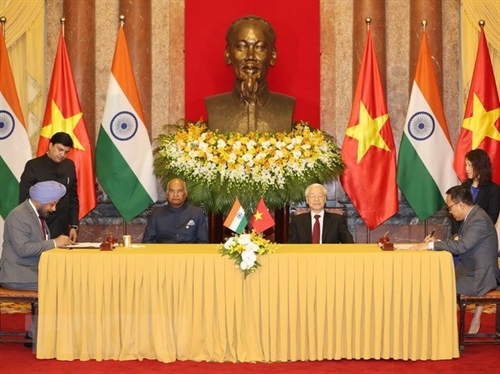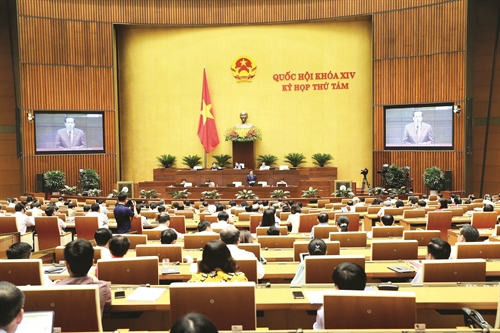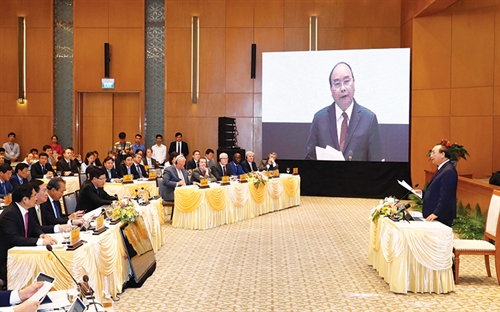Nguyen Ngoc Canh, M.Ec.
Director of the Foreign Exchange Management Department
State Bank of Vietnam
In recent years, especially 2019, the world economy witnessed a series of insecurities. While almost all economies show signs of a slowdown, trade tensions among economic giants, especially the US-China trade war, continued to undergo complicated developments. As a result, the global growth rate in 2019 dropped to the lowest level since the 2008-09 financial crisis. Gold prices spiked and crude oil prices strongly fluctuated, giving rise to risks in the international market and consequently, many countries had to loosen their fiscal and monetary policies.
Against the backdrop of a decline in the world economy and global trade, Vietnam’s economy has still recorded positive changes. The country has managed to attain the target of controlling inflation and keeping consumer price index at below 4 percent. The financial and monetary markets and exchange rates are proactively and flexibly regulated and kept stable. Foreign exchange reserves reach around USD 79 billion, total social investment is estimated at roughly 33.8 percent of GDP, and investment from the non-state sector increases to 45.3 percent. According to statistics from the Ministry of Planning and Investment’s Foreign Investment Agency (FIA), the amount of foreign investment capital disbursed in 2019 hit a record high of USD 20.38 billion. These results reflect the effectiveness of administration and management work of the Government, in which the State Bank of Vietnam (SBV) makes important contributions.
Achievements in foreign exchange management
Looking back at foreign exchange management work over the recent years, 2013 and 2014 could be viewed as the turning point in improvement of the system of institutions and policies with the promulgation of the Ordinance Amending a Number of Articles of the 2005 Ordinance on Foreign Exchange in March 2013 and its guiding text, Government Decree 70 in July 2014. On the basis of the 2005 Ordinance on Foreign Exchange, its 2013 amendments and relevant government decrees, the SBV has issued a series of legal documents facilitating and guaranteeing lawful interests of organizations and individuals engaged in foreign exchange activities, thus boosting economic development. Thanks to these efforts, a specific, complete, and comprehensive legal framework has been shaped, helping establish the order in the market, enhance laws and disciplines, improve effectiveness of state management of foreign exchange, narrow the “black market”, raise confidence in Vietnam’s currency and reduce “dollarization” of the economy. At present, despite many changes in the global financial market, the domestic foreign-currency market and gold market remain quite stable while the State’s foreign exchange reserves keep remarkably increasing.
Management of current transactions and use of foreign currencies
Based on Decree 70 of 2014 detailing the Ordinance on Foreign Exchange Management and Decree 89 of 2016 prescribing requirements on business entities acting as currency exchange agents or providing foreign currency receipt and payment services, the SBV has effectively applied measures to restrict the use of foreign currencies in the country, striving to reach the goal of reducing and putting an end to the “dollarization” of the economy, increasing people’s trust in the domestic currency, and minimizing negative effects on foreign-currency demand-supply balance as well as exchange-rate and monetary policies. At the same time, remittance policies have been devised and implemented in an open manner in conformity with integration trends, thus facilitating the flow of inbound remittances from overseas. Inbound remittances remain stable year-on-year. In 2019, Vietnam received approximately USD 16.7 billion of inbound remittances. As a result, the country’s payment balance has been improved and foreign exchange reserves increased. The SBV has also guided border-trade payment activities in a way more beneficial for the development of border trade so as to promote trade activities of traders and border residents while adhering to the principle of consistency of law and ensuring compliance with foreign exchange management regulations and conformity with international practices.
In order to attract sources of foreign currencies to stabilize the market and meet lawful foreign-currency demand, the SBV has implemented several solutions, one of which is the adoption of appropriate currency exchange management policies. To date, the system of currency exchange agents has been expanded. By the end of the third quarter of 2019, there are 619 currency exchange agents nationwide. The amount of foreign currencies exchanged via exchange agents in the first nine months of 2019 mounted to around USD 255.4 million, up by nearly 20 percent over the same period of 2018. As for the credit institution system, in the first 10 months of 2019, a cash amount of USD 160.6 million was sold by banks to individual customers, while the amount purchased from individual customers escalated to USD 5.04 billion, 1.5 times higher than the same period of 2018.
 |
| Electronic accessories-manufacturing lines of the RoK-invested YPE Vina Electronics Company in Binh Xuyen 2 industrial park, Vinh Phuc province__Photot: Hoang Hung/VNA |
Management of foreign investment activities
The SBV has so far issued 11 circulars governing the management of foreign exchange activities concerning offshore investment by Vietnamese businesses and foreign direct and indirect investment in Vietnam. Together with documents of higher legal validity, for example, Decree 135 of 2015 on offshore indirect investment, these circulars have helped form a transparent legal framework for domestic businesses to access the international capital market while creating an equal, non-discriminatory and open business environment to further attract foreign investment in Vietnam. In January 2019, the SBV issued Circular 06, marking an advance in the management of foreign exchange in foreign direct investment in Vietnam. Devised in consistency with other relevant provisions of the laws on investment and enterprises, the circular forms a legal foundation for prompt settlement of problems and shortcomings arising in reality and further facilitates foreign direct investment in Vietnam. Later in October, the SBV enacted Circular 15 adjusting and simplifying administrative procedures with a view to luring foreign investment capital in Vietnam in the context that foreign investors are fleeing from China in fear of the US-China trade war and Vietnam has become an official state member to the Comprehensive and Progressive Agreement for Trans-Pacific Partnership. These efforts have brought about positive changes in the flow of foreign investment capital into the country. The FIA’s statistics show that foreign direct investment pledged to Vietnam surpassed USD 38 billion in 2019, representing a year-on-year increase of 7.2 percent. The disbursement of foreign direct investment capital also saw a yearly increase of 7 percent to USD 20.38 billion. Last year, more than 3,880 new projects obtained investment registration certificates, up 28.2 percent over 2018, bringing in USD 14.68 billion in newly registered capital, equivalent to 93.2 percent of previous year. Meanwhile, 1,380 projects were allowed to raise capital by USD 5.8 billion.
Management of borrowing and repayment of foreign loans
Over the recent years, the SBV has constantly improved the legal framework on management of borrowing and repayment of foreign loans as well as provision and recovery of overseas loans, focusing on measures to strictly manage, and enhance supervision of businesses in, the borrowing of foreign loans without government guarantee.
Particularly, a series of legal documents on the borrowing and repayment of foreign loans without government guarantee were issued, including Government Decree 219 of 2013 on enterprises’ borrowing and repayment of foreign loans without government guarantee, SBV Circular 12 of 2014 on conditions for enterprises to borrow foreign loans without government guarantee, and Circular 03 of 2016 and its 2017 amendments guiding a number of issues relating to foreign exchange management in borrowing and repayment of foreign non-guaranteed loans by enterprises, thus shaping a complete legal framework for these activities. Current documents also facilitate the application of information technology in management of foreign loans, allowing enterprises to register and declare information on their loans and to make reports online so as to save time for completing administrative procedures while building a database on borrowing and repayment of foreign loans by businesses in a modern and scientific manner. Administrative procedures continue to be simplified through the abolishment of provisions requiring businesses to register foreign loans in the form of importing goods with deferred payment. Moreover, provisions on accounts for borrowing and repayment of foreign loans are standardized together with the addition of regulations on payment and bank transfer relating to guarantee for foreign loans.
It can be said that the SBV has accomplished the task of monitoring the foreign borrowing limit, ensuring compliance with the medium- and long-term borrowing limits approved annually by the Prime Minister and maintaining prudential ratios in national foreign debts.
Management of gold trading
The abnormal fluctuations of domestic and international gold markets during 2008-11 had exerted adverse impacts on Vietnam’s administration of exchange rate and monetary policies and on macroeconomic stability. To deal with this, the Government on April 3, 2012, issued Decree 24 on gold trading management, aiming at guaranteeing and protecting the people’s lawful ownership over gold; reorganizing the gold market, especially for gold bars; preventing impacts of gold price fluctuations on exchange rates, inflation and macroeconomic stability, repelling the use of gold as a payment instrument; and heightening the State’s role in managing and regulating the gold market.
To realize the above objectives, the decree drew out six basic solutions, including (i) recognizing and protecting organizations’ and individuals’ lawful ownership over gold; (ii) practicing the State’s monopoly over the production of gold bars through the SBV from May 25, 2012; (iii) allowing organizations and individuals to purchase and sell gold bars only at credit institutions and businesses licensed by the central bank to trade in gold bars; (iv) assigning the SBV to organize the export of gold materials and import of gold materials for production of gold bars; (v) prohibiting the use of gold as a payment instrument; and (vi) regarding gold jewelry production as a conditional business line for which a certificate is required.
In reality, the central bank has applied resolute measures, such as terminating the mobilization and provision of loans in gold; intensifying inspection of gold trading; disallowing credit institutions to provide loans for purchase of gold bars; and temporarily not permitting businesses to import gold materials.
After Decree 24 is enacted, to improve the legal framework for management of the gold market, from 2015 to 2019, the SBV issued four circulars guiding the decree and one circular promulgating the list of gold-related exports and imports under its management. It can be seen that after more than six years’ implementation of Decree 24, the gold market has been stabilized and properly regulated even when gold prices in the world see fluctuations. Gold speculation or arbitrary increase of gold prices causing economic instability has no longer occurred. Gold prices in the domestic market have become independent from fluctuations in exchange rates and the foreign exchange market. Since 2014, the SBV has no longer needed to import gold for the purpose of intervening into or stabilizing the market of gold bars. In another move, from 2012 up to now, the central bank did not license businesses to import gold. Instead, local businesses themselves have to self-balance and exploit gold materials in the market for producing gold jewelries and fine-art articles. The use of gold in economic transactions has been restricted while the volume of gold stored in safety boxes have initially been converted into cash to serve socio-economic development.
Management of foreign exchange reserves
Government Decree 50 issued in 2014 created a legal foundation for the SBV not only to gather foreign currencies with a view to increasing foreign exchange reserves but also to take the initiative in administering and investing in foreign exchange reserves. The central bank’s management of foreign exchange reserves has helped ensure international payment capacity while making profits. The SBV has also reduced the interest rate for foreign-currency deposits at credit institutions to zero percent per annum in order to raise profits of Vietnam-dong deposits against foreign-currency ones.
Over the past years, foreign exchange reserves have witnessed impressive growth rates thanks to the SBV’s application of numerous solutions to stabilize the macro-economy and limit the dollarization in the economy, effectively manage the foreign currency and gold markets, and intensify asset management work. Particularly in 2019, the foreign exchange reserves reached a record high of USD 79 billion. This shows the central bank’s successes in implementing policies in a coordinated manner with a view to ensuring long-term economic stability and keeping inflation at low rates for many years in tandem with maintaining relatively stable exchange rates. The growth rates in foreign exchange reserves are now sustainable instead of seeing latent risks of fluctuations as in the previous time.
The amount of foreign currencies purchased by the SBV is higher than the total surplus from current balance and capital balance after the central bank has proactively regulated exchange rates and intensified measures to limit the dollarization in the economy. Such impressive result has helped raise Vietnam’s stance in the international market with the country’ credit rating increasingly improved to stand at Ba3, which is the best so far. This has also contributed to reducing capital raising expenses of the Government and economic institutions in the international market, thereby increasing state budget revenues.
Solutions to intensify management of foreign exchange activities
Reviewing the five years’ period from the 12th National Party Congress, it is seen that the legal framework regulating monetary and banking operations in general and foreign exchange management in particular has been improved to become comprehensive, effective and feasible in spirit of the resolutions and directives of the Party Central Committee’s Political Bureau, National Assembly and Government.
To date, the SBV has issued or submitted to the Government for issuance 40 legal documents, including four decrees and 36 guiding circulars. It is expected that in 2020, the central bank will issue or submit to the Government for issuance one decree and two circulars concerning foreign exchange agents; provision of foreign currency receipt and payment services; border-gate transfer transactions; and inbound or outbound money transfer. This has facilitated the state management of monetary and banking activities, ensuring stability and safety of the banking system, step by step rectifying foreign exchange activities of market participants, and helping organizations and individuals carry out foreign exchange activities at home and abroad in accordance with law while guaranteeing their best access to economic benefits from production and business activities in order to consolidate their trust in the Vietnamese currency.
On the first day of this year, the Government issued Resolution 01 on major tasks and solutions for implementing the 2020 socio-economic development plan and state budget estimates. The resolution points out 10 groups of tasks and solutions, the most important of which is to further build and improve the legal system to be complete, modern, feasible and effective which is on a par with international law and meets innovation and development requirements.
In furtherance of the Government’s instructions in the above resolution as well as guidelines of the SBV Governor and in the context of complicated developments of the international financial market and the country’s more intensive and extensive global integration, the central bank will continue to implement solutions for enhancing the management of foreign exchange activities.
The first solution is to continue improving the legal framework on foreign exchange management. At present, documents of the highest legal validity regulating foreign exchange activities include the 2005 Ordinance on Foreign Exchange and its 2013 revision. These ordinances and guiding documents have formed a legal foundation and helped raise the effectiveness of foreign exchange management and limit the use of foreign currencies in Vietnam. However, the contents relating to foreign exchange and foreign-currency use are also provided in other documents of higher legal validity such as Law on Investment, Petroleum Law, Law on Public Debt Management, and Law on the State Budget, leading to the fact that the effect and implementation effectiveness of policies and regulations on foreign exchange management remain below expectation.
For the above reasons, it is necessary to issue a document on foreign exchange management of higher legal validity so as to increase the effect of enforcement of policies on foreign exchange management. In the time to come, a Law on Foreign Exchange should be devised to supersede the current Ordinance on Foreign Exchange to ensure the consistency and stability of the legal system ruling foreign exchange management and its suitability with the country’s reality and international trend. Furthermore, the SBV will continue to improve documents guiding foreign exchange management in each field in order to ensure the consistency of the system of legal documents on foreign exchange.
Second, drastic measures should be taken to further limit the use of foreign currencies and gold in the economy, build up the people’s trust in Vietnam dong, reserve foreign currencies for the banking system and stabilize the foreign currency market in particular and the macro-economy as a whole.
The third solution is to step up inspection and supervision and increase sanctions against violations in foreign exchange activities. The SBV should collaborate with related ministries and sectors and direct banking supervision units of provincial-level branches in conducting inspection and supervision to prevent and sanction violations of foreign exchange regulations, thereby making appropriate amendments to the current policies.
Last but not least, the central bank should step up disseminating policies on foreign exchange management, and coordinate with related agencies in providing training courses to introduce new regulations on foreign exchange management.-









